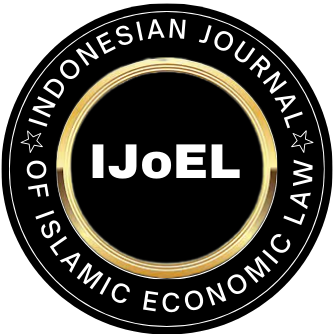The Comparative Analysis of the Hiwalah Fatwa between Indonesia and Malaysia
دراسة المقارنة : الحوالة في ضوء فتوى الهيئة الشرعية الوطنية لمجلس العلماء الإندونيسي ولجنة الإفتاء بالولايات الفدرالية الماليزية
DOI:
https://doi.org/10.23917/ijoel.v1i2.5507Keywords:
Hawalah; , National Shariah Commission Fatwas; , Comparative StudyAbstract
The objective of this study is to examine the differences and similarities in the application and interpretation of the fatwa on hawalah contracts between the Indonesian Ulema Council and the Malaysian Fatwa Committee. The research methodology employed in this study is qualitative research, employing a comparative approach. Following the collection of data from fatwas, books, and other literature, the data is subjected to inductive analysis in order to yield the results of this study. The analysis of similarities and differences, as well as compatibility with Islamic law, conducted between the DSN-MUI fatwa and the Regional Mufti of Biscotuan's fatwa on hawalah has led to the following conclusions: DSN Fatwa No. 12/DSN-MUI/IV/2000: The aforementioned fatwa is in accordance with Shariah principles as it fulfils the elements and conditions of hawalah without an increase in rent or profit. Fatwa No. 58/DSN-MUI/V/2007: The aforementioned instrument is not fully compliant with Shariah principles because it allows for the imposition of fees in the context of a pending hawalah transaction, which may potentially lead to riba. In contrast, the Mufti of Persekutuan Province has issued a fatwa that is compatible with Shariah principles. This fatwa ensures that hawala transactions are only between two parties with a debt-to-debt relationship and that no fees are charged. Consequently, the instrument avoids the imposition of usury. In this context, the fatwa of the Pijapat Persekutuan Mufti is more rigorous in maintaining compliance with Sharia principles, particularly in preventing usury. Although Islamic financial institutions recognise hawalah as a practical necessity, they must exercise caution to ensure that they do not contravene the fundamental Shariah principle of prohibiting usury.
Downloads
References
Aḥmad bin al-Ḥusayn bin ʿAlī bin Mūsā al-Khusrawjirdī al-Khurāsānī, Abū Bakr al-Bayhaqī. “Al-Sunan Al-Ṣaghīr Lil-Bayhaqī.” In 2. Bākistān: Jāmi‘at al-Dirāsāt al-Islāmiyyah, 1979.
Ainorrido’ie, M, and R A Norrahman. “Kontrak Pengalihan Hutang Al-Hiwalah dalam Praktik Keuangan Syariah.” Journal of … (2023). https://journal.banjaresepacific.com/index.php/jimr/article/view/2.
Al-Islāmiyyah, Iṣdār Wizārat al-Awqāf wa al-Shu’ūn. “Al-Mawsū’ah al-Fiqhiyyah.” In 12. Kuwait: Dār al-Ṣafwah, 1990.
al-Shaykh Aḥmad Muḥammad ʿAssāf. Al-Aḥkām al-Fiqhiyyah fī al-Madhāhib al-Islāmiyyah al-Arbaʿah. Bairūt: Dār Iḥyā’ al-ʿUlūm, 1988.
Al-Zuḥaylī, Wahbah. “Al-Fiqh al-Islāmī wa Adillatuhu.” In 5. Dimasyq: Dār al-Fikr, 1985.
Al-ʿAbsī, Abū Bakr ʿAbd Allāh bin Muḥammad bin Abī Shaybah al-Kūfī. “Al-Kitāb al-Muṣannaf fī al-Aḥādīth wa al-Āthār.” In 4. Riyāḍ: Maktabat al-Rushd, 1989.
Arifin, M H Zainal. “Fatwa Fatwa Lembaga Keuangan Syariah.” media.neliti.com (n.d.). https://media.neliti.com/media/publications/559076-fatwa-fatwa-lembaga-keuangan-syariah-8b83b44e.pdf.
Darma, Satria. “Implementasi Perbankan Syariah di Malaysia dan Indonesia.” Journal Economy and Currency Study (JECS) 3, no. 2 (2021).
Dewan Syariah Nasional MUI. Fatwa DSN NO: 12/DSN-MUI/IV/2000 Tentang Hawalah. Jakarta Pusat, 2000.
———. Fatwa DSN NO: 58/DSN-MUI/V/2007 Tentang Hawalah Bil Ujrah. Jakarta Pusat, 2007.
———. Fatwa DSN No 12/DSN-MUI/IV/2000 Tahun 2000 Tentang Hawalah. Jakarta Pusat, 2000.
———. Fatwa DSN Nomor 58/DSN-MUI/V/2007 Tentang Hawalah Bil Ujrah. Jakarta Pusat, 2007.
Harahap, M H, A R Jawab, and M Zen. “Wadi’ah dan Hawalah.” Al-karim: Journal of … (2024). https://journal.institercom-edu.org/index.php/alkarim/article/view/262.
Hardiati, Januri, Neni. “Al-Hiwalah dan Implementasinya pada Perbankan Syariah Ditinjau Dari Kaidah Fiqih.” Syntax Idea 3, no. 1 (2021).
Iṣdār Wizārat al-Awqāf wa al-Shu’ūn al-Islāmiyyah. Al-Mawsū’ah al-Fiqhiyyah. al-Kuwait: Dār al-Ṣafwah, 1990.
Mālik bin Anas. “Muwaṭṭa’ Al-Imām Mālik.” In 2. Bairūt: Mu’assasat al-Risālah, 1991.
Mardiah, Mardiah. “Hadis-Hadis Tentang Jasa: Wakalah, Kafalah, Hawalah (Telaah Sosiologis, Filosofis, dan Yuridis).” Mushaf Journal: Jurnal Ilmu Al Quran dan Hadis 2, no. 3 (2022).
Mohd Noor, Mohd Nazri, and Muhammad Ridhwan Ab. Aziz. “Developing a Hawalah Model for Islamic Car Financing Settlement.” I-iECONS e-proceedings (2023).
Mufti Wilayah Persekutuan. “Bayan Linnas Siri Ke-149: Status Pelangsaian Pinjaman PTPTN Menurut Perspektif Syarak.” Accessed June 19, 2024. https://muftiwp.gov.my/en/artikel/bayan-linnas/2620-bayan-linnas-siri-ke-149-status-pelangsaian-pinjaman-ptptn-menurut-perspektif-syarak?templateStyle=16.
———. “Bayan Linnas Siri Ke-149: Status Pelangsaian Pinjaman PTPTN Menurut Perspektif Syarak.” Mufti of Federal Territory’s Office. Last modified 2018. Accessed July 4, 2024. https://muftiwp.gov.my/en/artikel/bayan-linnas/2620-bayan-linnas-siri-ke-149-status-pelangsaian-pinjaman-ptptn-menurut-perspektif-syarak?templateStyle=16.
Muḥammad bin Aḥmad bin al-Azharī al-Harawī. “Tahdhīb al-Lughah.” In 5. Bayrūt: Dār Iḥyā’ al-Turāth al-‘Arabī, 2001.
Muhammadi, F, N F M Razif, and ... “Al-Rahn in Malaysia and Indonesia: Legal History and Upcoming Trajectory.” Asy-Syir’ah: Jurnal … (2021). https://www.asy-syirah.uin-suka.com/index.php/AS/article/view/1019.
Mulyadin, H R, N Herdiana, and ... “The Application of Akad Wakalah Bil Ujrah and Hawalah to Shariah Banking With a Focus on Ijarah Muntahiya Bitamlik and Mudharabah Products in the Perspective ….” Zona Law And Public … (2024). https://ejournal.zona-edu.org/index.php/ZLPAI/article/view/62.
Muslimin, Muslimin, Bintang Bintang, Evi Hendri Susanto, Fitria Agusti, and Alfin Dani Arwanto. “Efektivitas Khes dan Fatwa DSN-MUI terhadap Penegakan Hukum Ekonomi Syariah di Indonesia.” Jurnal Pendidikan Tambusai 6, no. 2 (2022).
Nasohah, Z, and N H Z Abidin. “Fatwa Authority In Government Institutions In The Federal Territory: Autoriti Fatwa dalam Institusi Pemerintahan di Wilayah Persekutuan.” al-Qanatir: International Journal of Islamic … (2022). http://www.al-qanatir.com/aq/article/view/539.
Rasyid Rizani, Fahmi Hamdi, and Erla Sharfina Permata Noor. “Penerapan Prinsip Syariah dalam Produk Perbankan Syariah.” Indonesian Journal of Islamic Jurisprudence, Economic and Legal Theory 2, no. 1 (2024).
Syafrida Hafni Sahir. Metodologi Penelitian. Yogyakarta: Penerbit KBM Indonesia, 2021.
Tazkiya, Khansa, Burhanudin Harahap, and Hari Purwadi. “Comparative Study of Islamic Legal Systems in the Application of the Istishna’ Agreement in Indonesia and Malaysia.” International Journal of Law and Society (IJLS) 1, no. 3 (2022).
Yanti, Bayu Vita Indah, and Umi Muawanah. “Dinamika Kesepakatan Perdagangan Lintas Batas antara Indonesia dan Malaysia dan Pengembangan Sentra Kelautan dan Perikanan Terpadu (SKPT) Sebatik di Kalimantan Utara.” Jurnal Kebijakan Sosial Ekonomi Kelautan dan Perikanan 10, no. 1 (2020).
Downloads
Submitted
Accepted
Published
How to Cite
Issue
Section
License
Copyright (c) 2024 Risdayani Risdayani, Muhammad Harsya Bachtiar, Ahyarudin Ahyarudin

This work is licensed under a Creative Commons Attribution 4.0 International License.






